
The Power of Listening in Higher Education
Three leaders in higher education share their approach to the unique challenges they’ve faced—from COVID-19 to changes in college culture.
The Power of Listening in Higher Education
Leaders always face some ambiguity, but there are certain crucible moments in every leader’s life that test resolve and solidify values. At these times, they draw on everything they have learned: analytical skills, critical thinking, communication strategies, and confidence. They maintain flexibility in the face of new obstacles and options. And they inspire others to follow their example.
At Booth there’s an understanding that leaders are tested not just in theory, but in practice. Students are challenged to immerse themselves in leadership experiences, to get feedback on their efforts, and to keep improving, so that they’ll be ready to face complex and rapidly changing scenarios.
In 1989 Harry L. Davis, the Roger L. and Rachel M. Goetz Distinguished Service Professor of Creative Management, created one of the first experiential leadership programs for full-time students at a top business school. Today, the LEAD program is the only required course for all MBA students outside the Executive MBA Program, making the practice of leadership a critical component of a Booth education.
As the world faces an exceptional period of uncertainty amid the coronavirus pandemic, seven alumni talk about when they had to lead even though the way forward was unclear—from the oil fields to the battlefield, through natural and man-made disasters—how their Booth training guided them, and what they learned to prepare them for the next big test.
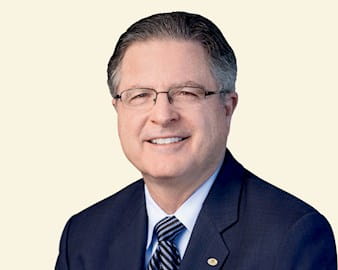
Across a nearly four-decade career in the oil industry, John S. Watson, ’80, saw oil prices plummet by 50 percent or more five separate times. Each time, energy companies had to rapidly reassess their business models, operations, and investment strategies. As chairman and CEO of San Ramon, California-based Chevron from 2010 to 2018, Watson was responsible for leading nearly 50,000 employees through the unsettling transitions.
“During a crisis, you have to be especially clear about what you want and what the priorities are,” Watson said. “You still need to listen, but you also need to make decisions more quickly.”
One such crisis emerged in late 2014, when oil prices, which had been riding above $100 a barrel, suddenly collapsed. Watson and his executive team quickly pivoted from a period of high spending on large projects to one of cutting costs. To preserve cash, they had to make difficult choices to pass up once-promising long-term development opportunities.
At the same time, Watson had to encourage employees who were understandably anxious about their jobs. So he opened the lines of communication between him and his employees as much as possible. He set a clear priority of maintaining safety standards. He explained how Chevron had cut capital expenditures in order to keep financial flexibility. He made sure to be available to answer questions, creating videos and holding town halls, and when people asked about layoffs, he told them about where the company had reduced costs and when he could expect to tell them more.
Watson’s time at Booth helped him build these communication skills, particularly the early behavioral science research movement that was surging at Booth while Watson was an MBA student. “It gave me some insight into how people think and what people respond to,” said Watson. You’re not going to know exactly what people are thinking, but you do your best to draw them out, to get them to talk about the things that are bothering them. Then you candidly and authentically address their concerns.”
It wasn’t enough simply to uphold the status quo. Watson motivated his employees to reassess how they did their jobs, reminding them that he didn’t have all the answers. “Tough times are the perfect moment to challenge people and give them real, on-the-job development opportunities,” he said. Employees came up with creative ways to reduce expenses and simplify their work processes, helping Chevron maximize limited resources.
Watson’s emphasis on providing transparency and setting defined goals positioned him to strengthen relationships inside the company as Chevron navigated to recovery. “When I retired, and employees came to talk with me, they didn’t thank me for the years we made $26 billion,” he said—the years when oil prices were soaring. “They appreciated that we got through some of those tough periods and stood by our values.” His straight talk was repaid with lasting loyalty.
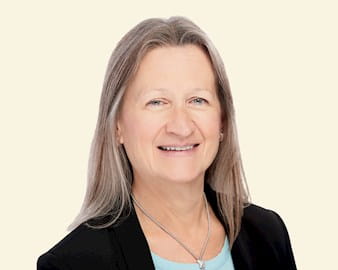
Helping clients through the 2008–09 financial crisis wasn’t just a matter of finding creative funding sources at a time when familiar options were rapidly disappearing. It also was a matter of responding with empathy to clients’ panic and anger, said Terri Wareham, ’82, managing director at Kaufman Hall, a Chicago-based consulting firm specializing in health care and higher education. “You had to manage emotions almost as much as you had to manage the intellectual outcomes,” she said.
Wareham and her cofounders started Kaufman Hall in 1985 as financial advisers to health-care providers, particularly not-for-profit hospitals and health systems. Over the decades, health-care financing structures became more complex. In the late 1990s and early 2000s hospitals began issuing auction-rate securities, a type of bond typically backed by bond insurance to give it a AAA rating. In late 2007 bond insurers’ credit ratings grew shaky, and then, unexpectedly, auction-rate securities began to fail. Interest rates on a portion of hospitals’ debt soared into the double digits.
Wareham was leading Kaufman Hall’s financial-advisory group at the time, and witnessed significant fear, anxiety, and second-guessing from their clients. Management teams—and their boards—demanded to know how a seemingly low-risk bond market could collapse. Wareham responded by drawing on both her analytical skills and behavioral science insights. She realized that understanding fundamental market history and its components was key for her clients to manage through the crisis. As such, she and her team drafted presentations to educate their client C-suites and boards, which provided an overview of the recent history of the bond market, the reasons why health-care providers had issued auction-rate securities, and how the market dynamics had changed.
As Wareham’s team was hand-holding and explaining to clients how they got into this predicament, the consultants also had to figure out how to get them out of it. That meant drawing on long-standing professional relationships with bankers, lawyers, and accountants to develop new financial products and creative solutions. “It was really leading my group of professionals through helping our clients identify and execute successful outcomes, while managing the clients’ emotional states as well,” Wareham said.
As they looked for solutions, the consultants were working constantly under stressful conditions, as clients berated them for global market failures that the consultants didn’t create and couldn’t control. Drawing from her behavioral science lessons, Wareham coached her consultants to manage client expectations and demonstrate empathy, asking them to consider the situation from their clients’ perspective. She counseled her team to be confident in their abilities as well as to develop stamina: the acute phase of the crisis, as Wareham recalled it, lasted nine to 12 months. Managing and leading her team was as important to successful client outcomes as managing the emotions of their clients in this time of disruption.
“I credit my education at Booth for teaching me to think critically, remain calm and thorough, to look at all the options before selecting the optimal solution,” Wareham said. Her patience helped to soothe the widespread panic. The experience reminded her of the importance of respecting all the factors, both rational and irrational, that drive decision-making—not just the seemingly rational ones.
“As the leader, you’ve got to get people from a difficult place to a better place, through the articulation of a shared vision and mission that they buy into.”
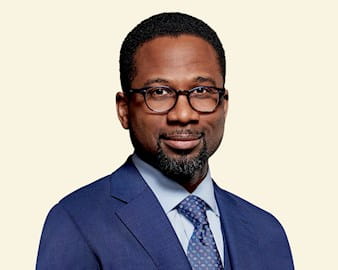
Across Chicago’s Loop, Shundrawn A. Thomas, ’99, faced a similar challenge of reassuring his team members in the midst of the financial crisis. But Thomas faced another challenge as well—he knew that he needed to implement a new strategy for the business he had just been appointed to lead. The prospective changes would upend processes, incentive plans, and organizational structure at an already unsettled time.
In December 2008, Thomas moved from head of corporate strategy for Northern Trust, a global financial services firm headquartered in Chicago, to become president and CEO of Northern Trust Securities, the parent company’s brokerage business with about 160 employees. “People talk about the proverbial first 90 days, but in a crisis, there’s not always 90 days to assess your options,” Thomas said. “There were some very critical decisions that had to be made in a relatively short period of time.”
Immediately, he scheduled a meeting with all employees. In the interest of transparency, he discussed the challenges facing the business, including tackling the elephant in the room. While it was a risk to tell his new team that their pay would decrease in the short term, he didn’t want to pretend otherwise. “You don’t want to immediately lose the confidence and trust of the people you’re leading,” he said. “Therefore, you must openly address a decision that is going to be different from what they’re expecting.”
During the candid dialogue with his team, Thomas emphasized that any changes would be based on the mission of helping Northern Trust serve its brokerage clients better. He said that he thought of decisions not as one-time choices but as a process within a consistent framework, which gave him flexibility around clear guiding principles that he could communicate to employees.
Ultimately, Thomas decided to reorganize the brokerage business from a structure of individuals independently managing client accounts to a team-based model that better aligned with Northern Trust’s core principles of service, expertise, and integrity. He spent a lot of time talking with employees to develop the strategy for the new business, and he set up multidisciplinary working groups to help shape the details of the new structure. “As the leader, you’ve got to get people from a difficult place to a better place, through the articulation of a shared vision and mission that they buy into,” he said. “You have to make them part of that process with you.”
As he led the redesign of Northern Trust Securities, he was grateful for his Booth courses in strategy and managerial decision-making. “Booth has one of the most flexible curriculums, and the breadth of classes helped prepare me for the role,” he said. “Many people who work in a corporate setting aren’t prepared to lead complex organizational change.”
The new approach to the brokerage business paid off with clients. In two years revenue increased from $90 million to $100 million, and the company’s profit margin improved by 7 percentage points. Thomas had predicted that moving to a team-based structure would unlock more value for both clients and employees. Thanks to the revised strategy, the group improved client loyalty and increased its overall compensation.
Thomas’s principled leadership during the financial crisis created more opportunity for his career as well. After two years, he left its brokerage unit to launch the FlexShares exchange-traded funds business for Northern Trust. Today, he is president of Northern Trust Asset Management and a member of the management group for Northern Trust Corporation.
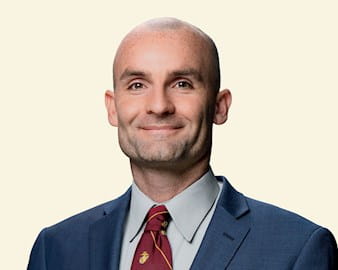
Wesley R. Gray, MBA ’10, PhD ’10, had just passed his comprehensive exams in 2004, after two years in the Booth PhD Program in finance, when he decided he wanted a break—an unconventional one.
Gray felt it was time to fulfill his long-held goal of serving in the US military. He negotiated a sabbatical from Booth and joined the Marine Corps for four years, which included eight months deployed in Iraq.
There, he discovered that his educational and military experiences offered parallel lessons in leadership. “I feel like Booth is the Marine Corps of education,” Gray said.
He particularly admired the example set by Eugene F. Fama, MBA ’63, PhD ’64, the Robert R. McCormick Distinguished Service Professor of Finance, and the 2013 Nobel laureate in economic sciences. “The way you win in this game is that you grind it out every day,” Gray said. “He’s a good leader in the sense that he leads by example. He’s in the office early. He still teaches PhD students. He would always be willing to share his time to help people make their research better. He would have been a great Marine Corps officer, to be honest. That mentality of the rigor and intensity of Booth has always resonated with me.”
In Iraq Gray also vowed to lead by example. He was assigned to a team that would train Iraqi soldiers, many of whom had no military background. To convince them to go out on dangerous patrols, he ventured out with them. Having studied Arabic, he tried to get to know the Iraqi troops under his command, to help communicate that he valued them as individuals. Gray worked to embody another leadership principle he had learned: “Officers eat last,” a Marine Corps saying that translates to “Leaders put others’ needs before their own.”
“You are the servant to your troops or your workers,” Gray said. “That’s where you really forge the bonds of being able to have influence on people—by taking care of them.”
The stresses of protecting others’ lives and his own weighed on Gray. Stationed in Barwana, a small Iraqi village with no running water, he slept in the local jail, which was often under mortar attack. “When we’d come back from a combat patrol, I would sit in that jail cell and read finance textbooks I had brought with me,” Gray said. “I learned how much I love learning through Booth. In Iraq reading helped my mental health because it would take my mind off reality.”
Since his return from Iraq, Gray has found that the leadership lessons he drew from the PhD Program and his military experience continue to help him navigate challenges. Today, he is the CEO of Alpha Architect, a boutique asset-management firm with more than $800 million in assets under management, based outside Philadelphia.
He reminds employees during tough times that they have overcome greater obstacles in the past, and that they have developed the discipline to keep moving forward each day. “Encourage people to do things that aren’t fun or aren’t pleasant, and then it’s not that weird when a new obstacle arrives,” he said. “Just keep grinding.”
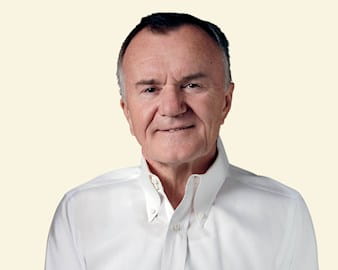
On the morning of June 12, 2008, employees of GreatAmerica Financial Services, a nationwide commercial-equipment finance company based in Cedar Rapids, Iowa, watched nervously as the Cedar River rose and rose outside their headquarters.
“Don’t worry,” officials told Tony Golobic, ’71, GreatAmerica’s founder, chairman, and CEO, that morning. “Just pile sandbags around storm sewer drains to hold back any floodwaters in the parking lot.”
But by noon, the situation was rapidly worsening, and officials told Golobic and more than 300 employees that they had just three hours to evacuate the building. By 3 p.m., Golobic had sent his workers home, held a meeting with his leadership team, and activated the disaster recovery plan, figuring the disruption would last a couple of days at most.
By the next day, their office building was more than eight feet underwater. The river crested at 31 feet—more than 10 feet above its previous record. The National Guard cordoned off all of downtown Cedar Rapids, which reeked of gasoline. In front of the GreatAmerica Building, household appliances had floated out of broken store windows and slammed into the parking meters, whose bent forms now lined the submerged street. The flooding had damaged all the electrical substations in the area, so there was no power, and there wouldn’t be any for a long time. This was no temporary setback.
Golobic’s customers, more than 3,000 commercial equipment dealers, distributors, and manufacturers from coast to coast, depended on his uninterrupted service in real time, and his competition, major bank affiliates, were providing that, so Golobic had a problem.
He realized that he needed to find longer-term office spaces for his employees, who wouldn’t all fit in GreatAmerica’s own disaster-recovery facility, a smaller space 55 miles away. The challenge was that every other executive in the area was trying to find space to rent too.
The first thing Golobic had to do was to communicate with his employees, being honest about the potential consequences of the disaster for GreatAmerica and assuring them that although the situation was bad and could get even worse, together they could turn the disaster into the company’s finest hour. Golobic believes that honest communication, no matter how bad a situation may be, builds trust and at the same time paints a picture of a bright future that can be achieved with everyone’s help. “It is important to tell your employees what is in it for them, also.”
He leaned on what he had learned at Booth to get through the next steps. “One thing I took away from the University of Chicago is the fundamental understanding that when there is a big challenge, that big problem is only a bunch of smaller subsets put together,” he said. That understanding helped him sort through options—and to create a backup plan for each choice, which helped him be decisive amid uncertainty.
Ultimately, Golobic borrowed a number of office spaces, even one from a friend that was 83 miles east, and rented buses to take employees back and forth every day. He knew the commute was a lot to ask, so he frequently checked on employees, personally handing out paychecks. He also made sure to pass on encouraging messages from customers, like this one: “Tony, GreatAmerica is a much better company, even when under water, than anyone else is on dry land.”
By September, GreatAmerica was back in its Cedar Rapids office. But only two weeks later, Lehman Brothers filed for bankruptcy protection, freezing the credit markets. Once again, Golobic used the analytical frameworks he had learned at Booth to break down the economic disaster and tackle manageable problems.
As he had just a few months earlier, Golobic told employees that the situation was bad, but that their company would emerge from the crisis stronger. When others were cut off from funding, GreatAmerica was able to substantially increase its credit lines and gain market share. “It’s important not just to say you’re going to survive,” he said. “You have to tell them how you, together with everyone’s greatest efforts, are going to turn a disaster into an even greater future.”
“You never get all the information you would like before you make a decision.”
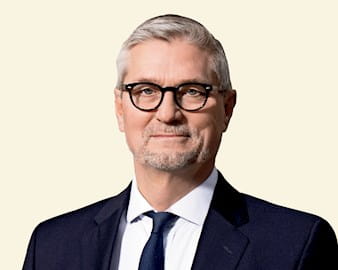
“You never get all the information you would like before you make a decision,” said Erik Østergaard, ’01 (EXP-6), CEO of the Danish Transport and Logistics Association, based in Copenhagen, Denmark.
Østergaard said Booth’s Executive MBA Program taught him to recognize patterns more quickly than others—a skill that has enhanced his leadership on corporate boards. “You suddenly get a completely different mind-set in looking at businesses,” he said. “It’s like being able to see more pieces of a jigsaw puzzle than other people normally do.”
Østergaard put that skill to use in 2009, when he joined the board of Dansk Autohjælp, Denmark’s second-largest road-haulage assistance company (similar to AAA motor club in the United States). When he was asked to take over as chairman just a few months later, with the benefit of his Booth education backing him, he dug deeper into the company’s financials, and found it was in even worse shape than he had realized from his initial due diligence.
He said, “When working at the board level, you get the ability to move into a company and, fairly easily, get a quick overview of where the problems are and where you need to focus your attention as a director. You can get an overview of the competitive situation, the financial strength of the company, and weaknesses in the organizational structure.”
Dansk Autohjælp had excellent products and services, Østergaard learned, and customers had a positive view of its business. But its systems hadn’t kept up with rapid expansion. Two large IT projects had failed to deliver improvements. Restrictions from lenders hindered its ability to make long-term investments. Its auditors’ report bristled with caveats and qualifications. And, Østergaard discovered, the company needed to make dramatic management changes.
Østergaard’s confidence in his foundation helped him respond to the ensuing turmoil. Some shareholders revolted over the proposed management overhaul and threatened to replace the entire board. Østergaard stood his ground.
“If you put me up for election after I just joined, I’m not going to volunteer to be reelected,” he told the disgruntled shareholders. “But I can guarantee this: if you don’t change the course of the company, it’s going to be bust before the end of the year.”
Østergaard won the standoff. Within three years, he hired a new CEO, and the company went from losing money to recovering profitability. In 2012 he led the sale of Dansk Autohjælp to a larger competitor, SOS International, with full backing from shareholders. Østergaard then joined the board of SOS for three years, having demonstrated his ability to see the larger picture.
“Titles don’t mean anything if you truly want change—it has to come from within.”

As the brand-new North American CEO of the French spirits and wine company Pernod Ricard in December 2019, one of the first tasks facing Ann Mukherjee, ’94, was to approve a new marketing campaign for Absolut Vodka, the company’s premier brand. But right away, she felt the plans were all wrong.
“It was a campaign focused on projecting the image of social responsibility, but it was doing it in a way that was not authentic to the brand,” Mukherjee said. “It would have been a throwaway.” Turning around Absolut, which had been losing market share, was crucial to Mukherjee’s success in her role. But if her first big decision was to reject her new employees’ strategy, it could damage her relationships from the start.
As she often does, Mukherjee relied on the leadership style she learned at Booth: be humble, focus on asking questions, and avoid imposing a predetermined outcome. “It’s about finding the right questions—therefore, we don’t have a foregone conclusion of what success looks like,” she said. “You’re trying to figure out a series of potential outcomes and working through the pros and cons. When you have that open way of thinking, it creates different possibilities.”
Mukherjee began asking employees in Sweden, where Absolut is made; in the United States, where the marketing campaign would be executed; and in France, where Pernod Ricard has its corporate headquarters, to convince her that the marketing campaign would succeed. As she probed their thinking, she discovered that no group felt truly committed to the concept, yet each believed that the other groups strongly backed it.
That revelation allowed her to pivot, guiding them through development of a new plan in just three weeks. “Coming back to my Booth education, we were taught never to do anything as a hammer,” she said—in other words, by using your power as a boss to force an agenda. “We were taught to do things backed by our discipline and logic and rigor, and then to present the argument. Titles don’t mean anything if you truly want change—it has to come from within.”
After Mukherjee convinced Pernod Ricard’s board to sign off, the new marketing campaign launched on Valentine’s Day. Partnering with the anti–sexual violence organization RAINN (Rape, Abuse & Incest National Network), Absolut added onto their slogan: “Drink Responsibly. Sex Responsibly.” Reminding consumers of the importance of consent, Absolut’s new campaign read: “Only a Yes to Sex Is a Yes. Because sex without consent is sexual assault.” Absolut also committed to donating $1 to RAINN for every share and retweet their campaign received.
In promoting the campaign, Mukherjee allowed herself to be authentic and vulnerable, speaking publicly to Glamour magazine about her own experience as a survivor of sexual assault and about her mother’s death in a traffic crash with a drunk driver. In sharing such personal motivations, Mukherjee emphasized the true desire for change behind Absolut’s campaign—and then she led by example, signing on to join RAINN’s national board.
The campaign was a success: “It ignited social conversation,” Mukherjee said. It also may have been a turning point. In recent weeks, Absolut has gone from a declining brand to one of the fastest growing in its segment, increasing sales by double digits. Signs for Absolut are pointing in the right direction.
At all times, and especially now, being an effective leader means navigating uncertainty: facing unexpected scenarios and making quick decisions with incomplete information. It takes transformative leaders to respond to these challenges with flexibility and creativity, empowering their colleagues to rise to the occasion.
Illustration by Chris Gash

Three leaders in higher education share their approach to the unique challenges they’ve faced—from COVID-19 to changes in college culture.
The Power of Listening in Higher Education
In Interpersonal Dynamics with professor Lisa Stefanac, ’09, students learn to build relationships through open, vulnerable communication.
The Data of Feelings
Since taking the helm in 2018, Niccol is credited with the company’s turnaround, ensuring burrito bowls reign well into the future.
Inside Chipotle with CEO Brian Niccol